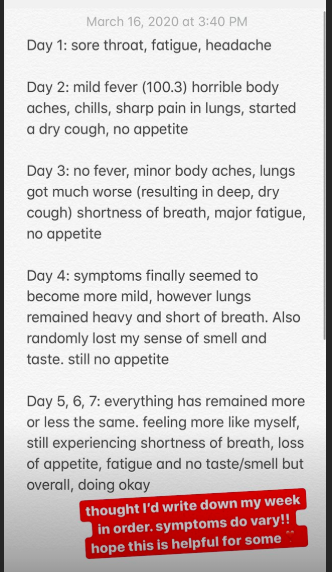U.K. Medical Group Cautions Sudden Sensory Loss May Be a COVID-19 Symptom
Editor's Note
Join The Mighty’s Coronavirus group to connect with other Mighties living through the pandemic. Read the latest updates, share helpful tips, or give and receive virtual support.
Update: In April, the Centers for Disease Control and Prevention (CDC) officially updated its list of COVID-19 symptoms. Among the six new symptoms is new loss of smell or taste, a symptom that was first reported by professional rhinological organizations around the globe. The CDC also added chills, repeated shaking with chills, muscle pain, headache and sore throat as common COVID-19 symptoms to watch for.
On Saturday, ENT UK and British Rhinological Society issued a statement alerting the public that a sudden loss of smell could be an early or “invisible” symptom of COVID-19. The report adds to a growing body of evidence from around the world about this potential symptom of the novel coronavirus.
COVID-19 (SARS-CoV-2) is a respiratory virus believed to have jumped from bats to humans. The virus causes symptoms such as fever, cough and shortness of breath as well as severe lung complications in serious cases. As experts around the world gather evidence about the virus, new potential symptoms are being identified. This includes potential digestive symptoms as well as, according to ENT UK, a sudden loss of your sense of smell (also called asomia/hyposmia).
“There have been a rapidly growing number of reports of a significant increase in the number of patients presenting with anosmia in the absence of other symptoms,” Claire Hopkins, BMBCh, MA FRCS, president of the British Rhinological Society, wrote in a statement for ENT UK. Hopkins added:
I have personally seen four patients this week, all under 40, and otherwise asymptomatic except for the recent onset of anosmia — I usually see roughly no more than one a month. I think these patients may be some of the hitherto hidden carriers that have facilitated the rapid spread of COVID-19. Unfortunately, these patients do not meet current criteria for testing or self-isolation.
There is the potential to reduce COVID-19 transmission by requesting that individuals with new onset of anosmia self-isolate. A lost sense of smell as marker of COVID-19 infection… for full details see below pic.twitter.com/udkBMwwJ1F
— ENT UK (@ENT_UK) March 20, 2020
Hopkins outlined how other countries have revealed similar increases in cases of patients with a sudden loss of smell. In Germany, Hopkins said more than two out of three confirmed cases of COVID-19 reported a loss of smell. South Korea has reported about 30% of patients who tested positive for the virus had a sudden loss of smell as their major presenting symptom in what was determined to be a mild case of the illness.
On Twitter, New York Times reporter Sarah Maslin Nir shared that a sudden loss of smell and taste prompted her to get tested for COVID-19.
“I mostly feel like I’ve been run over by a truck, no fever no other symptoms. Except one really freaky one (that’s emerging in studies) which is I have zero sense of taste or smell,” Maslin Nir wrote. “I mean ZERO.”
I mostly feel like I’ve been run over by a truck, no fever no other symptoms. Except one really freaky one (that’s emerging in studies) which is I have zero sense of taste or smell. I mean ZERO.
— Sarah Maslin Nir (@SarahMaslinNir) March 21, 2020
Ok thanks. Other folks telling me that loss of taste and smell are what tipped them off, and that some docs are diagnosing based on that symptom alone, sans test.
— Jeneen Interlandi (@JInterlandi) March 21, 2020
Actress Rachel Matthews, best known for her roles in “Frozen II” and “Happy Death Day,” also tested positive for the coronavirus. In an Instagram story, Matthews said on day four of the infection, though her symptoms became milder, she “randomly” lost her sense of smell and taste.

In ENT UK’s statement, Dr. Hopkins said that it’s not necessarily surprising COVID-19 would cause a sudden loss of smell for patients. Other forms of the coronavirus, such as those that cause the common cold, lead to an estimated 10-15% of anosmia cases after infection. Hopkins said about 200 other viruses cause the same symptom and are a leading cause of a sudden loss of smell in adults.
Judy Stone, an infectious disease specialist, wrote for Forbes that you can test your sense of smell and taste at home with household items. For smell, try citrus, strong-smelling soap or cleaning supplies. For taste, try things that are usually sweet, salty, sour or bitter.
Also seltzer taste like it’s usual self which is comforting
— Sarah Maslin Nir (@SarahMaslinNir) March 22, 2020
ENT UK indicated in their statement it’s important to highlight new COVID-19 symptoms, especially those like a sudden loss of smell or taste, because they can indicate people who are infectious without other typical symptoms. Those who suddenly lose their sense of smell should contact their health care professional and self-isolate.
“It could potentially be used as a screening tool to help identify otherwise asymptomatic patients, who could then be better instructed on self-isolation,” wrote Hopkins. “In addition to the current symptom criteria used to trigger quarantine, we might be able to reduce the number of otherwise asymptomatic individuals who continue to act as vectors, not realising the need to self-isolate.”
Concerned about coronavirus? Stay safe using the tips from these articles:
- New Study Suggests Digestive Issues Can Be First Sign of COVID-19
- Which Face Masks Prevent Against Coronavirus?
- How to Make Your Own Hand Sanitizer
- 8 Soaps You Can Use to Help Prevent the Spread of Illness
- Coronavirus and Chronic Illness: What You Need to Know
The Mighty reached out to ENT UK for additional comment and has yet to hear back.

